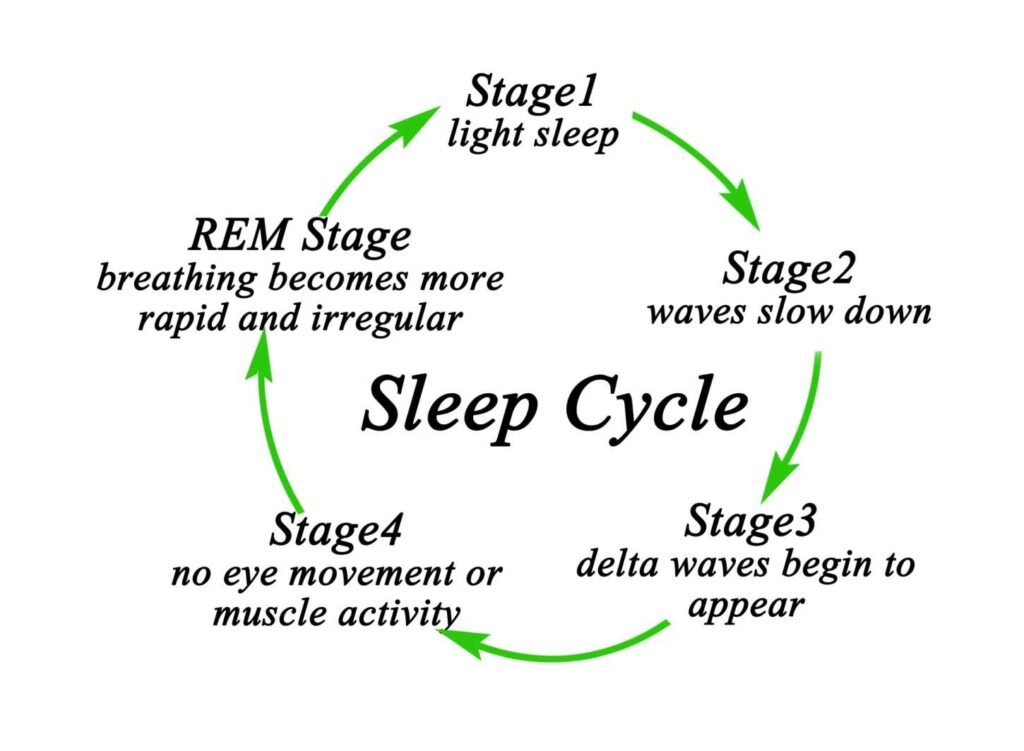Stage 3 Non-Rapid Eye Movement sleep is a crucial stage of the sleep cycle.
Stage 3 Non-Rapid Eye Movement (NREM) sleep is one of the four stages of NREM sleep, which is characterized by slow brain waves, relaxed muscles, and a decrease in heart rate and breathing. Stage 3 Non-Rapid Eye Movement sleep is also known as deep sleep, and it is the stage where the body repairs and regenerates tissues, strengthens the immune system, and consolidates memories.

During Stage 3 Non-Rapid Eye Movement sleep, the brain produces delta waves, which are slow and high-amplitude brain waves. This stage typically lasts between 20 to 40 minutes in adults and is the deepest stage of sleep. It is during this stage that the body releases growth hormones, which are essential for growth and development in children and adolescents. Adults also benefit from deep sleep as it helps to maintain physical health and cognitive function.
However, several factors can affect Stage 3 Non-Rapid Eye Movement sleep, including sleep disorders such as sleep apnea, restless leg syndrome, and periodic limb movement disorder. These disorders can disrupt the sleep cycle and prevent the body from entering deep sleep, leading to daytime sleepiness, fatigue, and other health problems. Understanding the importance of Stage 3 NREM sleep and the factors that affect it is crucial for maintaining overall health and well-being.
Understanding Stage 3 Non-Rapid Eye Movement Sleep
Stage 3 Non-Rapid Eye Movement (NREM) sleep is a crucial phase of the sleep cycle, characterized by slow-wave sleep (SWS) and delta waves, which are large and slow brain waves. This stage of sleep is also known as deep sleep and is essential for physical and mental restoration.
Characteristics of Stage 3 NREM Sleep
During Stage 3 Non-Rapid Eye Movement sleep, muscle activity decreases, and breathing, heart rate, blood pressure, and body temperature also decrease. The brain activity slows down, and delta waves become more prominent. Sleep spindles and K-complexes, which are brief bursts of brain activity, are also present during this stage.
Physiological Changes During Stage 3
Stage 3 Non-Rapid Eye Movement sleep is crucial for the repair and restoration of the body’s immune system, cells, tissues, and neurons. It is also believed to play a role in memory consolidation and learning. In children, deep sleep is essential for growth and development, while in adults, it is crucial for maintaining overall health and well-being.
Cognitive and Developmental Impact
Sleep deprivation or disruption of Stage 3 NREM sleep can have adverse effects on cognitive function, memory, and emotional well-being. In children, it can lead to behavioral problems and learning difficulties, while in adults, it can increase the risk of developing chronic health conditions such as obesity, diabetes, and cardiovascular disease.
In conclusion, Stage 3 Non-Rapid Eye Movement sleep is a vital phase of the sleep cycle that is essential for physical and mental restoration. It plays a crucial role in the repair and restoration of the body’s immune system, cells, tissues, and neurons, as well as memory consolidation and learning. Adequate deep sleep is crucial for overall health and well-being, and disruption of this stage of sleep can have adverse effects on cognitive function, emotional well-being, and overall health.
Impact on Health and Disorders
Sleep Disorders Related to Stage 3 NREM
Stage 3 Non-Rapid Eye Movement (NREM) sleep plays an important role in maintaining good health. However, disruptions in this stage of sleep can lead to various sleep disorders. One such disorder is sleep apnea, which is a condition where breathing repeatedly stops and starts during sleep. This can cause a person to wake up frequently during the night, leading to interrupted sleep and daytime sleepiness.
Another disorder related to Stage 3 NREM sleep is sleepwalking, which is a condition where a person gets up and walks around while still asleep. This can be dangerous, as the person is not fully aware of their surroundings and may injure themselves. Narcolepsy is another sleep disorder that can be related to Stage 3 NREM sleep. This is a condition where a person experiences sudden and uncontrollable sleep attacks during the day, which can interfere with their daily activities.
Promoting Healthy Stage 3 NREM Sleep
To promote healthy Stage 3 NREM sleep, it is important to maintain good sleep hygiene. This includes going to bed and waking up at the same time every day, avoiding caffeine and alcohol before bedtime, and creating a comfortable sleep environment. Exercise can also help promote healthy sleep, as it can help regulate the sleep cycle and circadian rhythm.
If a person is experiencing difficulty sleeping or has a sleep disorder, it is important to consult with a doctor. Medications and other treatments may be available to help manage sleep disorders and improve sleep quality. The American Academy of Sleep Medicine is a reputable resource for information on sleep disorders and treatment options. By taking steps to promote healthy Stage 3 NREM sleep, a person can improve their overall health and well-being.
Stage 1 Non-Rapid Eye Movement Sleep
Stage 2 Non-Rapid Eye Movement Sleep
Sleep Hygiene Education: Improving Sleep Quality through Healthy Habits

Sleep hygiene refers to the set of practices and habits that promote good sleep quality and quantity. It involves creating an environment that is conducive to sleep, establishing a regular sleep routine, and adopting behaviors that promote relaxation and reduce stress.
Continue reading about: Sleep Hygiene Education
Understanding Parasomnias: Disruptive Sleep Disorders Explained

Parasomnias are a group of sleep disorders that involve abnormal behaviors, emotions and activities during sleep. They can really impact sleep quality and overall health.
Continue reading about: Parasomnias




